Post
A catch
Save a catch to start your fishing logbook. You will be able to to share it with the community if yo want!
A fishing trip
Post an ad to go fishing with other fishermen
Save a catch to start your fishing logbook. You will be able to to share it with the community if yo want!
Post an ad to go fishing with other fishermen
Share a thought, a question with the community
My favorite cities
×Keep your rods ready for Boca-Raton in Palm Beach. The fishing forecast is currently 3.3. The most caught fishes here are the brill fish, the dolphinfish, the lane snapper and the yellowfin tuna. Come try the most famous fishing techniques like the dive fishing, fishing bream from a dock or jetty, boat fishing for eel or fishing with traps.
Our fishing forecast of Boca Raton indicates the best time to go fishing in this city.
The Brill fish
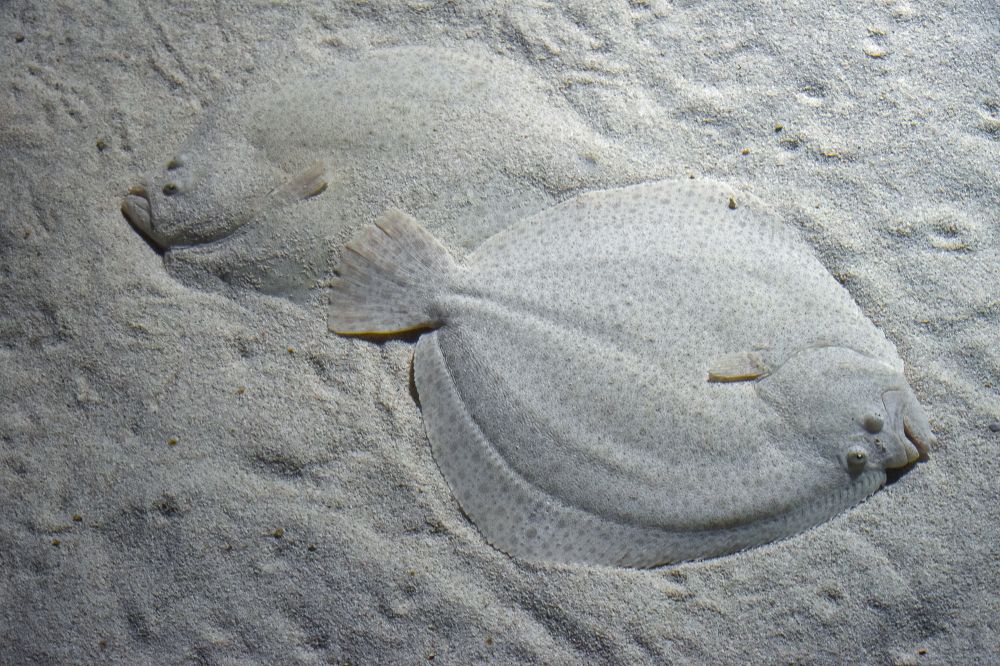
The brill fish belongs to the Scophthalmidae family. The minimum size of capture is 30 cm but can reach 75 cm for 6 kg. He can live up to 3 years. It breeds from late spring to early summer. The female can lay up to 15 million eggs. It can be fished all year. The brill has an oval body. It rests on its right side and has its left side. Thus, when placed with the head facing left, both eyes are located above the mouth. Its common name of brill comes from a particularity of its dorsal fin, whose origin is far in front of the eye and whose first rays are free and branched. The distance between the two eyes is greater than the diameter of one eye. The lateral line is very curved at the pectoral fin. As with many flatfish, the coloring is variable and depends on the biotope. The brill is indeed capable of homochromia, i.e. to match the color of the background. The coloring is rather brown, more or less speckled, and also varies according to the environment on a live fish. It has many round spots whose edges are incomplete rings of darker colors. The blind side is whitish.
The Brill fish is a famous fish you can catch in Boca Raton.The Dolphinfish
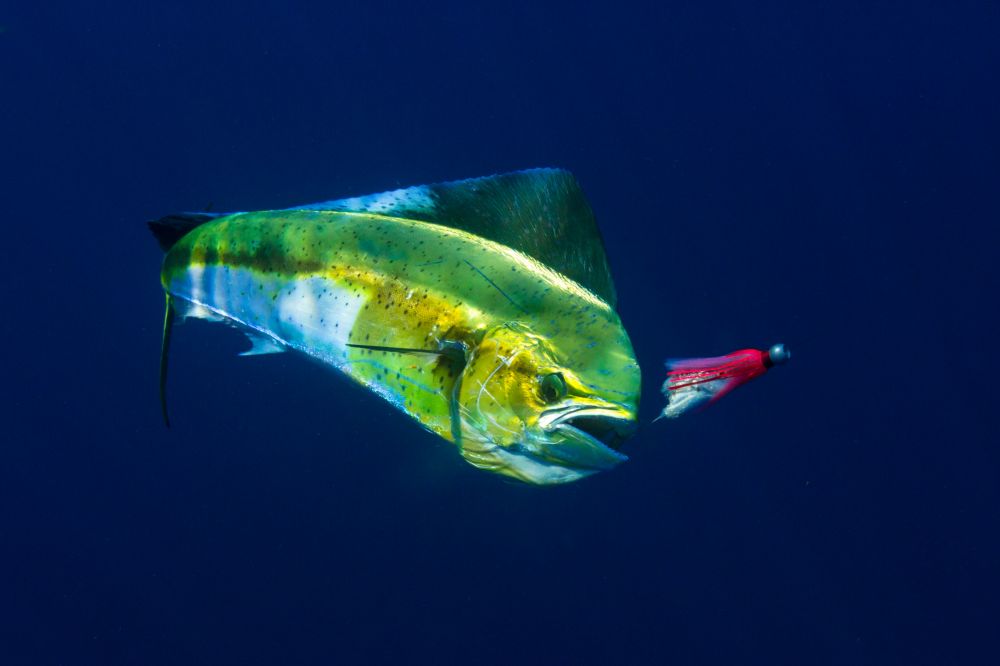
The Dolphinfish belongs to the Coryphaenidae family. Its length can reach a maximum of 2 m, but the average length reaches 1 m. Its average weight is 14 kg but it can reach more than 30 kg. It has a maximum lifetime of 4 years. It can reproduce all year round. The best time to catch it is from April to June. There are two species of dolphins. It is easy to distinguish the two species. They both have the same elongated and spindle-shaped shape. The single dorsal fin extends over the entire length of the body. The anal fin begins approximately in the middle of the body and ends at the same point as the dorsal fin. Pelvic fins are located under the pectoral fins and can be compressed into a shallow groove in the body. The caudal fin is strongly forked. The head is dull and the mouth contains many small teeth, as well as a small oval dental patch on the tongue. Cycloid scales cover the body. Mature males exhibit dimorphic sexual growth and develop a prominent bone crest at the front of the head. The color of the dolphinfish is quite dramatic with golden shades on the sides, irregular spots of metallic blue and green on the back and sides, and whites and yellows on the underside. This fish is very colorful underwater, captures light and reflects a wide range of bright colors.
The Dolphinfish is a famous fish you can catch in Boca Raton.The Lane Snapper
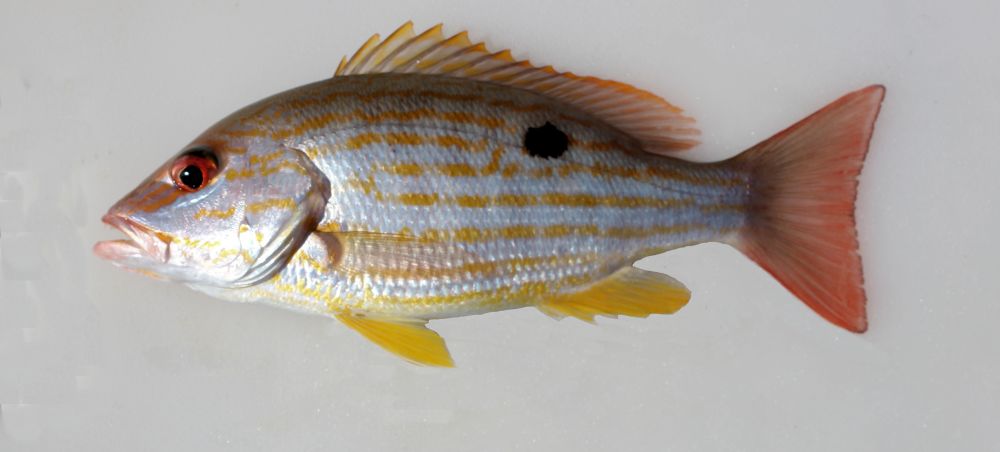
The Lane Snapper belongs to the Lutjanidae family. Lane snappers have an average length of 36 cm and a maximum length of 50 cm. Sexual maturity is achieved at lengths of 10 to 23 cm. The maximum estimated age of the snapper is 10 years. Their spawning period depends on the location. It can be fished in late spring and early summer. The snapper has a deep body and a pointed snout. It has a double dorsal fin, with a curved anal fin and short pectoral fins. The caudal fin is emarginated to slightly forked. Lane snapper has two color phases. The coloring of the deep water phase is darker and more pronounced than that of the resting phase in shallow water. The two color phases have the upper sides and the backs pink to red with a green shade. The lower sides and belly are silvered with a yellow shade. The head has 3 or 4 yellow bands from the snout to the eye, the lower jaw slightly protrudes. There are eight to ten horizontal yellow to pink stripes on their sides and three or four stripes below their anterior dorsal radius. There is a diffuse black spot under the soft part of the dorsal fin. All fins range from yellow to red.
The Lane Snapper is a famous fish you can catch in Boca Raton.The Yellowfin Tuna
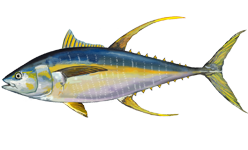
The Yellowfin Tuna belongs to the Scombridae family. The maximum reported length for yellowfin tuna is 280 cm overall length and the maximum weight is 400 kg. It can live for about 7 years. It reproduces all year round. It can be fished all year round. Yellowfin tuna is a large tuna. Its body is strongly tapered and deeper under its first dorsal fin, while decreasing considerably towards the caudal peduncle. Two dorsal fins are present. In adults, the second dorsal fin is very long, as is the anal fin, located directly below the second dorsal fin. These fins become relatively longer in larger individuals. The pectoral fin is also long and extends beyond the space between the dorsal fins. The caudal peduncle is very thin and includes three sets of pins. Seven to ten dorsal and ventral pinnacles are present. Behind the corselet, scales are missing, and a band of big scales encircle the body behind the head. A swim bladder is present. The eyes are small; the teeth are small and conical. The body is dark blue or metallic greenish above, while the belly and lower sides are silvery white with many interrupted vertical lines. Perhaps more clearly, a golden stripe runs along the side. The second dorsal and anal fins and pinnacles are bright yellow, and the pinnacles are bordered by a narrow black band.
The Yellowfin Tuna is a famous fish you can catch in Boca Raton.The Bluefish
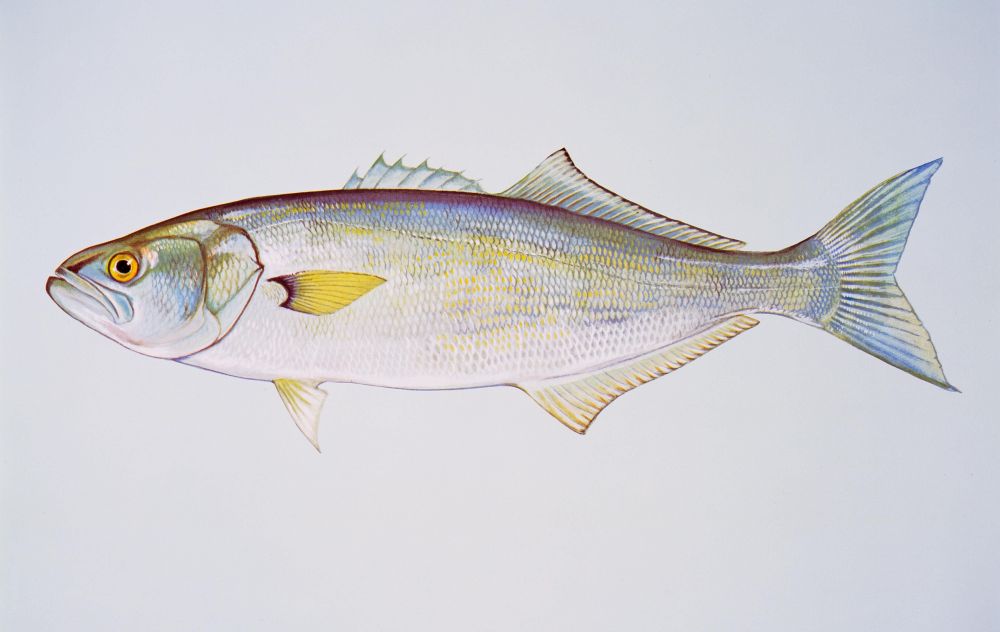
The Bluefish belongs to the Pomatomidae family. The average size of the bluefish is 18 cm for a weight of 9 and a maximum of 18 kg. It can live up to 9 years. They breed from June to August. It can be found in abundance in summer. The body is oblong and elongated. The head is quite short and the jaws are powerful, armed with strong incisors. The lower jaw is thick. The first dorsal fin is composed of short, robust spiny rays, the second dorsal fin and the anal fin are approximately symmetrical. The body and the caps are covered with small cycloid scales. The body is blue grey to dark green grey on the back, the sides and belly are silvery. A dark mark at the birth of the pectoral muscles is characteristic.
The Bluefish is a famous fish you can catch in Boca Raton.Our fishing forecast of Boca Raton indicates the best time to go fishing in this city.
Our fishing forecast of Boca Raton indicates the best time to go fishing in this city.
Our fishing forecast of Boca Raton indicates the best time to go fishing in this city.
